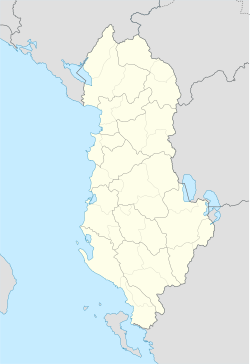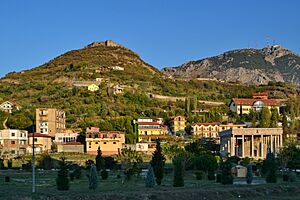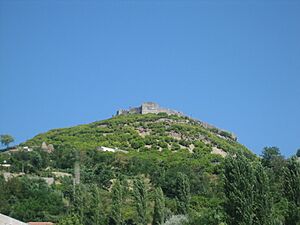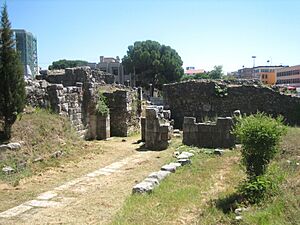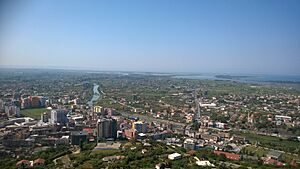Lezhë facts for kids
Quick facts for kids
Lezhë
|
|||
|---|---|---|---|
|
Photomontage of Lezhë
|
|||
|
|||
| Country | |||
| County | Lezhë | ||
| Settled | 4th century BC | ||
| Area | |||
| • Municipality | 509.1 km2 (196.6 sq mi) | ||
| Population
(2011)
|
|||
| • Municipality | 65,633 | ||
| • Municipality density | 128.920/km2 (333.90/sq mi) | ||
| • Municipal unit | 15,510 | ||
| Demonym(s) | Albanian: Lezhjan (m), Lezhjane (f) | ||
| Time zone | UTC+1 (CET) | ||
| • Summer (DST) | UTC+2 (CEST) | ||
| Postal Code |
4500
|
||
| Area Code | (0)215 | ||
Lezhë is an important city in Albania. It is the main city of Lezhë County and a very old place. People have lived here for about 2,400 years! This makes Lezhë one of the oldest cities in Albania that has been continuously inhabited.
Lezhë was a major stronghold for the Illyrians, who were ancient people living in the western Balkans. Its first walls were built around the 4th century BC. It was a key city in the Illyrian kingdom. Later, it was taken by Philip V of Macedon and became Macedon's way to the Adriatic Sea.
The Illyrians eventually got the city back. After wars with Rome, Lezhë became part of the Roman Empire. Lezhë is also famous as the place where Skanderbeg united the Albanian lords. They formed the League of Lezhë to fight against the Ottoman Empire.
Contents
What's in a Name?
In ancient times, Lezhë was called Lissós in Greek and Lissus in Latin. You can even find this name on old coins! The name Lissós might come from a Greek word meaning 'smooth rock'.
Over time, the ancient name Lissus changed into the modern name Lezhë. In Turkish, it was known as Leş, and in Italian, it was called Alessio.
A Look at Lezhë's Past
Early Settlements
Archaeologists have found signs of human life in Lezhë from a very long time ago. Swords from the Mycenaean period (around 1600-1450 BC) show that people here traded with ancient Greece. The first buildings were made by the Illyrians during the Late Bronze Age and Early Iron Age.
The first settlement was built on a 413-meter-high mountain called Mal i Shëlbuemit. This happened around the 8th century BC. It was close to where the Drin river meets the sea.
The Illyrian City
The area around Lezhë was home to the Illyrii tribe. A Greek historian named Diodorus said that Dionysius of Syracuse founded a city called Lissos in 385 BC. He wanted to protect trade routes in the Adriatic Sea. However, some historians think this might have been another city, not modern Lezhë.
The earliest walls of the city were built by the Illyrians in the late 4th century BC. The city grew from the old Iron Age fort on the mountain. It was built on a lower hill (172 meters high) and surrounded by strong walls. These walls protected the city from attacks by sea and guarded the route inland.
By the 3rd century BC, Lezhë was one of the most important cities in the Illyrian kingdom. This was under the Ardiaean and Labeatan dynasties. In 228 BC, the Illyrian queen Teuta made a peace treaty with Rome. She promised that her ships would not sail south of Lezhë.
Later, an Illyrian commander named Demetrius of Pharos broke this treaty. He sailed south of Lezhë and attacked other places. This led to more conflicts with Rome.
Roman and Medieval Times
Lezhë was located in the territory of the Labeatae tribe during Roman times. The city kept a lot of its freedom even when it was ruled by Macedon and the Illyrians. This is shown by the coins that were made there.
In 211 BC, Philip V of Macedon captured the citadel of Lezhë, called Acrolissus. Lezhë then surrendered to him. This gave Macedon a way to reach the Adriatic Sea. But the Illyrians later took the city back.
Lezhë was important during the Roman Civil War. It was taken by Marc Antony and then stayed loyal to Caesar. In Roman times, it was part of the province of Epirus Nova.
During the Middle Ages, Lezhë often changed hands. The Venetians took control of it in 1386. It was still theirs when Skanderbeg died. However, in 1478, the Turks captured it during the siege of Shkodra. It was only under Venetian rule again for a short time (1501–1506).
Because it was a neutral place under Venetian control, Skanderbeg chose Lezhë in 1444. He gathered the Albanian nobles and lords there. They formed the League of Lezhë to unite and defend themselves against the Turks. Skanderbeg was buried in the cathedral of Lezhë, which was later used as a mosque.
Lezhë Today
Today, Lezhë is a growing city. It is close to the port of Shëngjin. Its location on the main road between Montenegro and Tirana makes it a good place for businesses.
Where is Lezhë?
Lezhë Municipality is in Lezhë County, in the northern part of Albania. It includes several smaller towns and villages. The municipality stretches from the Plain of Zadrima in the north to the mouth of the Mat River in the south. To the west, it meets the Albanian Adriatic Sea Coast. The total area of the municipality is about 509.1 square kilometers.
Weather in Lezhë
Lezhë has a hot-summer Mediterranean climate. This means it has hot, dry summers and mild, wet winters. The average temperature for the year is about 14.6 degrees Celsius.
| Climate data for Lezhë | |||||||||||||
|---|---|---|---|---|---|---|---|---|---|---|---|---|---|
| Month | Jan | Feb | Mar | Apr | May | Jun | Jul | Aug | Sep | Oct | Nov | Dec | Year |
| Mean daily maximum °C (°F) | 10.1 (50.2) |
11.7 (53.1) |
15.0 (59.0) |
18.9 (66.0) |
23.9 (75.0) |
27.6 (81.7) |
31.0 (87.8) |
30.9 (87.6) |
27.2 (81.0) |
21.6 (70.9) |
16.1 (61.0) |
11.7 (53.1) |
20.5 (68.9) |
| Daily mean °C (°F) | — | — | — | — | — | — | 18.5 (65.3) |
18.2 (64.8) |
15.2 (59.4) |
10.9 (51.6) |
7.0 (44.6) |
4.2 (39.6) |
— |
| Mean daily minimum °C (°F) | 1.8 (35.2) |
3.0 (37.4) |
5.2 (41.4) |
8.8 (47.8) |
13.0 (55.4) |
14.7 (58.5) |
18.5 (65.3) |
18.2 (64.8) |
15.2 (59.4) |
10.9 (51.6) |
7.0 (44.6) |
4.2 (39.6) |
10.0 (50.1) |
| Average precipitation mm (inches) | 165 (6.5) |
143 (5.6) |
129 (5.1) |
118 (4.6) |
87 (3.4) |
60 (2.4) |
36 (1.4) |
52 (2.0) |
104 (4.1) |
136 (5.4) |
191 (7.5) |
179 (7.0) |
1,400 (55) |
| Average rainy days | 13 | 12 | 13 | 13 | 10 | 8 | 5 | 6 | 8 | 10 | 14 | 13 | 125 |
| Average relative humidity (%) | 74 | 71 | 69 | 69 | 68 | 64 | 59 | 61 | 68 | 71 | 75 | 75 | 69 |
| Mean monthly sunshine hours | 130.2 | 130 | 173.6 | 201 | 269.7 | 306 | 362.7 | 322.4 | 258 | 207.7 | 138 | 117.8 | 2,617.1 |
| Mean daily sunshine hours | 4.2 | 4.6 | 5.6 | 6.7 | 8.7 | 10.2 | 11.7 | 10.4 | 8.6 | 6.7 | 4.6 | 3.8 | 7.2 |
| Source: Weather2visit | |||||||||||||
Getting Around Lezhë
Lezhë has city buses that help people travel around. There are also buses for longer trips to other cities and countries. The city has a train station, but trains don't run very often.
The main highway in Lezhë is SH 1. This road connects Lezhë to Shkodër in the north and to the Durrës-Kukës Highway (A1) in the south. Another road, SH32, connects Lezhë to the coastal town of Shëngjin.
People of Lezhë
In 2011, the population of the whole Lezhë municipality was 65,633 people. About 15,510 of these people lived in the city of Lezhë itself.
Fun Facts and Culture
Lezhë has a football club called KS Besëlidhja Lezhë. They also have teams for basketball, wrestling, and beach volleyball.
Archaeologists have been digging around the ancient Acropolis of Lissos and the Skanderbeg Memorial since 2004. They have found old buildings, tombs, and other interesting things from different time periods.
Famous People from Lezhë
- Antonio Bruti, a merchant and diplomat from the 16th century
- Anton Kryezezi, a Bishop of Lezhë
- Lekë Dukagjini, a prince
- Jonima (Gjoni) family, a noble family
- Gjergj Fishta, a Catholic priest and poet
- Ndoc Gjetja, a poet
- Henri Ndreka, a football player for Albania
- Robert Grizha, a football player
- Erjon Dushku, a football player
- Renato Malota, a football player
- Ornel Gega, a rugby union player
- Tosol Bardhi, a 16th-century Albanian Catholic Priest
- Florjan Përgjoni, an Albanian football player who plays for KF Tirana
- Indrit Tuci, an Albanian footballer who plays for Sparta Prague
Images for kids
-
The grave of Skanderbeg and Lezhë Castle on its hill. The structure was the former Selimie Mosque.
See also
 In Spanish: Lezhë para niños
In Spanish: Lezhë para niños
 | Anna J. Cooper |
 | Mary McLeod Bethune |
 | Lillie Mae Bradford |









